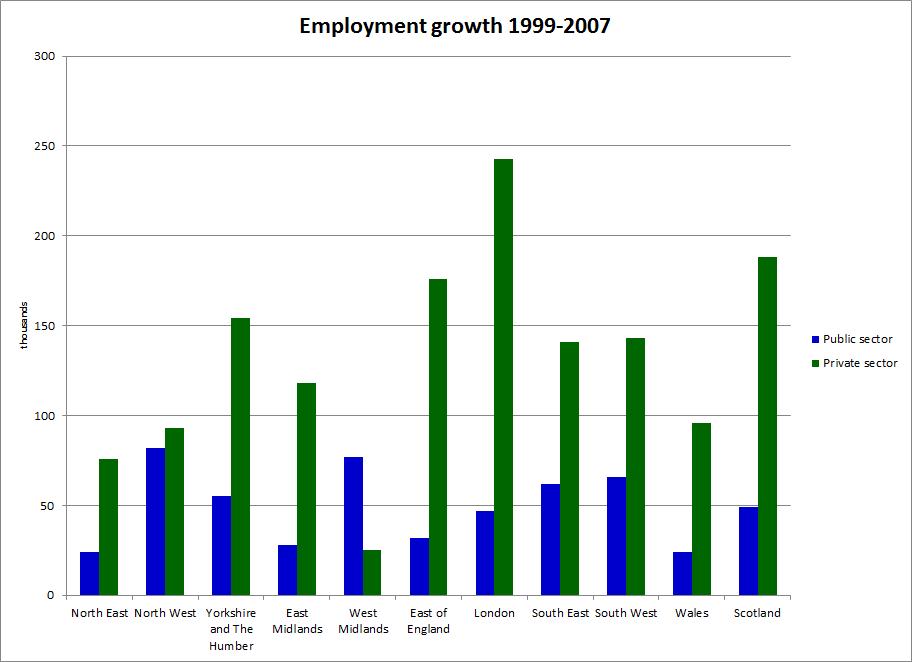Mythologising the north-south divide

The idea that employment in the northern regions of England is overwhelmingly dependent on the state is one of the more pervasive myths about the UK labour market. I'd suggest that its persistence owes a lot to the ideological narratives it serves to underpin, on both the left and the right.
Here's Jeremy Warner in today's Telegraph 'Successive governments have tended to address [the North South] divide, which seems to be notably worse in Britain than any other developed country of comparable size, through ever bigger fiscal transfers. Under Gordon Brown, great swathes of the public sector were relocated to the regions, and the benefits system was bolstered to help engineer more equitable spending power. Predictably, these policies have only succeeded in embedding a culture of dependency while simultaneously pricing the private sector out of the market for enterprise and jobs.' http://www.telegraph.co.uk/finance/economics/10188204/Why-Britain-needs-...
And here's the Centre for Research and Socio-Cultural Change (CRESC) ‘The ex-industrialised regions, especially the North East and West Midlands, have no other visible means of support except [the state and para-state sector] because, after losing an old industrial base, they are being partially compensated by the creation of new [state and para-state] jobs in education and health plus pensions for surplus workers through the provision of long-term invalidity benefit.’ http://www.cresc.ac.uk/sites/default/files/wp%2075.pdf The comparison is perhaps unfair - CRESC have actually done some real research, some of the conclusions of which which I happen to disagree with, while Warner is simply repeating some well-worn cliches, but the claims being made are identical, and are exaggerated to the point of losing all contact with reality.
Public sector employment accounts for about a fifth of all employment in Great Britain. In no region or country does the public sector share exceed 26% (Wales- and this figure reflects the impact of recession on private sector employment: in 2007 it was 22%)*. So the great majority of employment in all regions is in the private sector. Within England, the public sector share as of the last quarter of 2012 ranged from 16.6% in the South East to 22.2% in the North East. Yes, there is variation, and yes, it is associated with the economic divide between the greater South East and the rest of Britain, but a range of 6 percentage points in non-recessionary years is a shaky support for the kind of assertions I've just quoted. An embedded culture of dependency? No visible means of support except the state? Pricing the private sector out? Come off it.
As for the notion that the last government's policy on regional employment was to pump up public sector employment, the chart shows that between 1999 and 2007 in every region except the West Midlands, most jobs growth was in the private sector, and by a very large margin in most cases. But the argument is logically defective as well as empirically wrong. Successive governments have relocated some public sector jobs to the regions, but the Office for National Statistics and the DVLA are small beer compared to the bulk of public sector employment (albeit important to their local labour markets). Do we have under-utilised hospitals, schools, police stations and benefits offices in areas of high unemployment, put there to mop up surplus labour? Of course not. Employment in these services is driven by the needs-based funding formulas which (at least for the time being) underpin the distribution of expenditure. (To be clear, CRESC are using a different measure of employment which they estimate to be dependent on the state, which they argue accounts for the majority of job creation. I don't agree with their theoretical framework, although I've no quarrel with how they've operationalised it.)
Are sickness and disability benefits being used to provide 'pensions for surplus workers'? This is a longstanding favourite theme on the right and the left, but it simply ignores trends in benefit receipt http://www.guardian.co.uk/commentisfree/2011/jul/28/david-cameron-disabi... Rates of receipt have fallen sharply, once we look take account of age, and they have fallen most in those areas (ex-industrial and mining) and among those (older, male) age bands which accounted for the bulk of the steep rise in disability benefit receipt in the 1980s and early 1990s. And whatever faults the last government can be accused of, making it easier to claim sickness and disability benefits is not one of them.
None of this is to downplay the importance of regional differences in employment, earnings and poverty, but we shouldn't let these disparities become the vehicle for what is basically a fantasy about post-industrial Britain in which everyone outside the greater South East is living off the taxpayer. The fact that the free-market right and a poor-mouthing regional left have converged on this diagnosis doesn't make it correct. On their website CRESC state: 'Our users read our results through the frame of their political beliefs about the economy and society. Many disagreed with our interpretation.' With respect, again, come off it. You don't need an ideological frame to disagree with this sort of exaggeration - a Nomis account should be enough.
Data on public sector employment from http://www.ons.gov.uk/ons/rel/lms/labour-market-statistics/july-2013/dat... Total employment from ONS Regional Labour Market Statistics database.
*The share has historically been significantly higher in Northern Ireland, which, as I often seem to have to remind people, is not part of Great Britain. http://www.ons.gov.uk/ons/rel/pse/public-sector-employment/regional-anal...